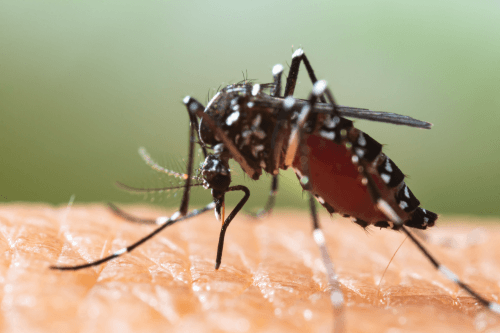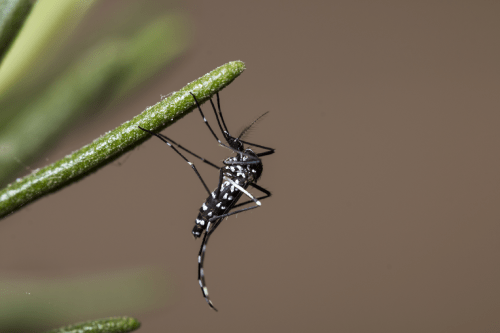Home / Blog / Everything You Need To Know About Asian Tiger Mosquitoes
Everything You Need To Know About Asian Tiger Mosquitoes

Scientifically reviewed by Daniel Baldwin, BCE, CCFS, CP-FS
-Published on November 29, 2022
-Updated on July 13, 2023
Asian tiger mosquitoes have become more prevalent in the U.S. since their introduction from southeast Asia. They have slightly different feeding and activity patterns than the native house mosquito, but they do carry disease. Learn what to look for and how to keep these ‘skeeters’ away from your yard.
What are Asian tiger mosquitoes?
Asian tiger mosquitoes are aggressive, human-biting mosquitoes that were introduced from Asia to the continental U.S. in 1985. They are a unique insect due to their feeding habits: they are active all day, unlike more common mosquito species that tend to avoid the heat of the day and feed during dusk.
What do Asian tiger mosquitoes look like?
The unique name of the Asian tiger mosquito comes from their distinctive white stripes, like their namesake, the tiger. The body of the Asian tiger mosquito is dark gray or black, and they have noticeable thin, white stripes on their bodies and legs.
They can be slightly larger than common mosquitoes, with bodies around 6 millimeters. Note that this length doesn’t include their legs, which can be quite long.
Where are Asian tiger mosquitoes found?
Since their introduction to the U.S. via Hawaii in 1985, Asian tiger mosquitoes have now migrated to most of North America. They live year-round in warmer areas, like the southern U.S., but are known to overwinter in colder climates as well.
Female Asian tiger mosquitoes do not lay eggs directly in water like many other mosquito species. Instead, eggs are laid on the sides of or near water-holding containers. These mosquitoes also do not lay their eggs in areas of natural soil substrate, such as marshes, swamps, or flooded ditches. Eggs are laid in artificial habitats (such as flowerpots) and natural habitats (such as tree holes). This tendency characterizes them as ‘container breeders’.
In your yard, undisturbed puddles, bird baths, or items that might hold stagnant water like discarded tires or playground equipment can make perfect breeding grounds for tiger mosquitoes.
Asian tiger mosquito bites
The bite of the Asian tiger mosquito isn’t any worse than the more common mosquito species we have in the U.S.
Some redness, itchiness, and swelling are normal—although some people can react more severely to mosquito bites than others.
The more pressing concern around an Asian tiger mosquito bite is not the annoying itchiness and swelling, but that the bite can transmit several harmful and potentially life-threatening diseases. The most concerning of these are West Nile virus, Zika virus, yellow fever, and St. Louis encephalitis.
How to prevent Asian tiger mosquitoes
Avoiding Asian tiger mosquitoes is all about prevention. Female Asian tiger mosquitoes lay their eggs in shallow, undisturbed water, so the more areas on your property that fit this description, the more you may see buzzing around. If you take away their preferred breeding grounds, the Asian tiger mosquito will be more likely to seek friendlier places to breed and live.
As we mentioned above, the Asian tiger mosquito doesn’t only bite at dusk, as with other species, so you are susceptible to bites from these species at all times of the day.
Here are some tips for preventing Asian tiger mosquitoes from bothering you:
- Perform routine lawn and yard maintenance to decrease the amount of swampy areas on your property
- Clean up any sources of pooling water, like bird baths, old tires, tarpaulins, and potholes that fill with water
- Spray mosquito repellent on yourself while you’re outside during the warmer months
- Use citronella candles or lemongrass scent to deter mosquitoes from getting close to your outdoor play or dining areas
The good news is that with some easy prevention, you may be able to reduce the number of Asian tiger mosquitoes that would breed in your area. This is not only great because it reduces the chance of transmission of deadly viruses like West Nile and Zika, but it will also make your summertime activities in your yard much more pleasant!
Related Articles
Visit our blog to learn more.
→





